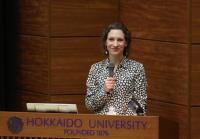Earlier this month, a group of IPinCH team members, including myself, Joe Watkins, Hirofumi Kato, Dave Schaepe, Rachel Giraudo, Carol Ellick, and Mayumi Okado, participated in a symposium on cultural heritage issues affecting Ainu and other Indigenous peoples.
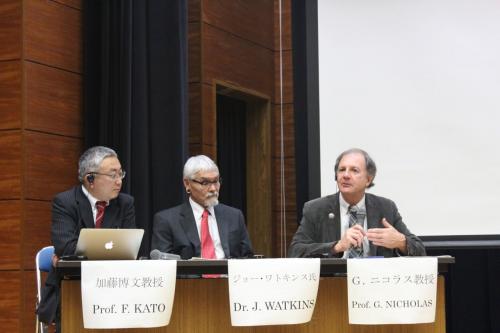 Held in Hokkaido, Japan, the symposium was organized and largely funded by the Center for Ainu and Indigenous Studies at Hokkaido University (CAIS; an IPinCH partner).
Held in Hokkaido, Japan, the symposium was organized and largely funded by the Center for Ainu and Indigenous Studies at Hokkaido University (CAIS; an IPinCH partner).
In 2009, Joe and I travelled to Hokkaido University to speak about the IPinCH project. Here we began conversations with representatives of the Ainu Hokkaido Association and with community members and artisans from several communities, most notably Nibutani Village. The Ainu had only recently been recognized by the Japanese government as the official Indigenous population, and they were looking for guidance on how to develop heritage policies and protocols. There was much interest in IPinCH, and this was the beginning of what has become a long and productive relationship. In 2010, two members of the Ainu Association, Hidehiko Kimura and Tatsuo Nishijima, attended our Case Study Workshop in Vancouver, and in January 2011, members of IPinCH travelled to Lake Akan, in Hokkaido, to 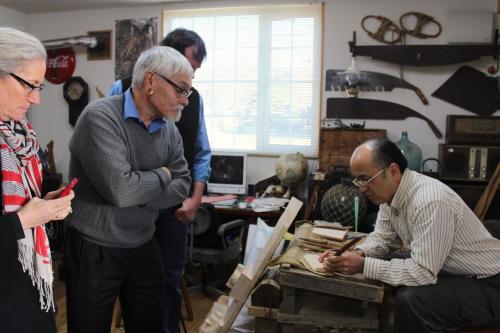 participate in another symposium on intellectual property.
participate in another symposium on intellectual property.
The symposium held this month allowed us to renew our acquaintances, share information and highlight accomplishments, and come to a better understanding of the opportunities and challenges confronting Ainu people.
The most important development, however, took place after the symposium concluded. Following a shared final meal with our Ainu hosts and Japanese colleagues in Nibutani Village, Joe and I renewed our commitment to work on behalf of the Ainu communities, both personally and through IPinCH. Our Ainu and Japanese colleagues had already expressed their appreciation for the efforts that IPinCH has made, particularly in translating information on our community-based initiatives into Japanese. Many of these community-based initiatives are relevant to them.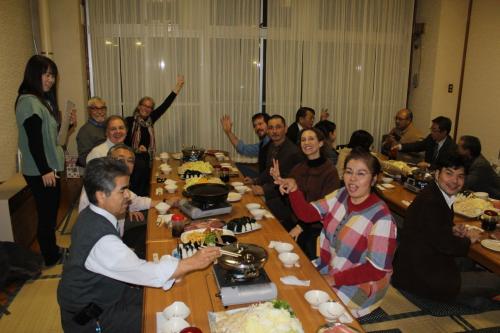
At each of our previous meetings, we had asked our Ainu colleagues how IPinCH could best assist them. We had never received a clear response.
Seated on tatami mats around a low table, we once again requested that our hosts, representatives of the Biratori Branch of the Ainu Association and Nibutani village, tell us how IPinCH might support their efforts to protect Ainu heritage. This time we were given two specific ways we could contribute.
First, Mr. Hidehiko Kimura asked if IPinCH could help the Ainu Association gain access to the major collections of Ainu materials in North American 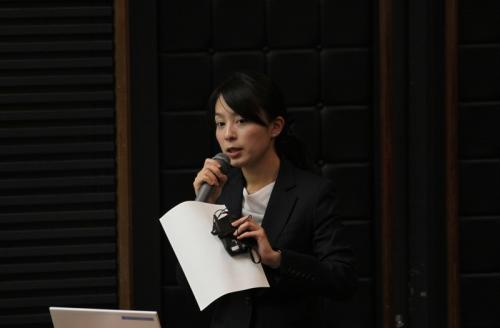 museums. Second, Mr. Toru Kaizawa, a famed artist, told us that Ainu artists and artisans wanted assistance in connecting with their North American counterparts to discuss marketing strategies, to explore the melding of traditional and modern techniques, and to share concerns about commodification, and more. What was clear in our discussion at the table was that Ainu heritage is a living thing, not limited to objects of the past. This hour-long conversation was made possible through a sense of mutual trust and respect that has developed over the years.
museums. Second, Mr. Toru Kaizawa, a famed artist, told us that Ainu artists and artisans wanted assistance in connecting with their North American counterparts to discuss marketing strategies, to explore the melding of traditional and modern techniques, and to share concerns about commodification, and more. What was clear in our discussion at the table was that Ainu heritage is a living thing, not limited to objects of the past. This hour-long conversation was made possible through a sense of mutual trust and respect that has developed over the years.
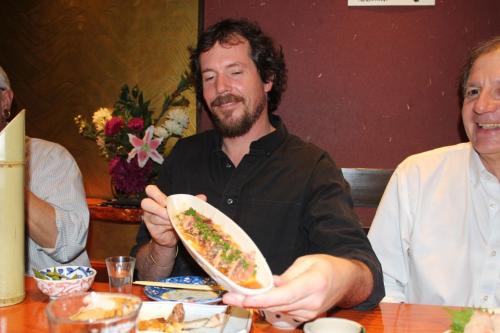 We have already made progress on the two tasks that we’ve been charged with and plans are also underway to publish the proceedings of the 2011 and 2013 symposia. We will also continue to explore other ways to collaborate with the Ainu and with our colleagues at Hokkaido University.
We have already made progress on the two tasks that we’ve been charged with and plans are also underway to publish the proceedings of the 2011 and 2013 symposia. We will also continue to explore other ways to collaborate with the Ainu and with our colleagues at Hokkaido University.
Photos (courtesy of Rachel Giraudo and CAIS): Rachel speaking at the symposium; Hirofumi, Joe and George on a panel; Carol, Joe and Dave visiting Ainu carver, Toru Kalzawa; the final dinner with the symposium participants; Mayumi speaking at the symposium; Dave showing off his meal.
For more information and photos about the symposium, "Indigenous Heritage and Tourism: Inheritance and Creation of Living Heritage," held at the Center for Ainu and Indigenous Studies click here >
See SFU's Media Release on the event: Indigenous cultural revitalization in Japan


